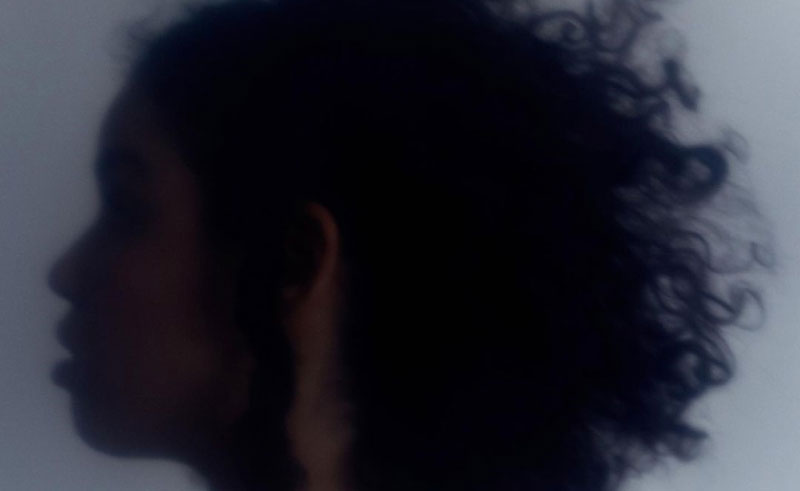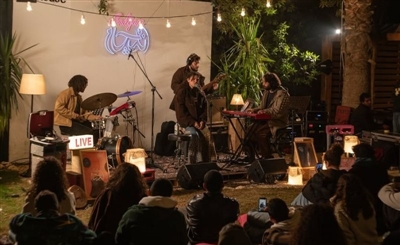Ikram Bouloum Reclaims Moroccan Identity in ‘Ha-bb5’ EP
'Ha-bb5' is essentially a tale of the conflict of identity within oneself and against the culture imposed--and stolen--by history.

In an artful new EP, Ha-bb5, Moroccan artist Ikram Bouloum expresses the nuances of identity amidst the context of a crisis for migration, the multilayered notion of culture, and a reclaiming of power, space, and voice, literally
Released on So Urgent, Ha-bb5’s five tracks form a holistic experience, with each sentence, beat, and pause tying into the next, intentionally and almost strategically delivered to project her artistic detail. In other words, the EP reads as a dramatic piece of literature that would fit comfortably into the pages of an epic--think The Iliad and Odyssey, but divinely feminine, Arab, and certainly more badass.
We follow a cultivated life cycle through the tracks: a birth, death, tragedy, a call to action/rebirth, and finally, the reclamation. The sequence directly rejects linearity or the semblance of monotony, and produces a project that is radical, feminist, emancipated, and original.
Exploring the multidimensionality of her identity, Ikram Bouloum sings in her mother tongue, Amazigh, as well as in English and Catalan.‘Henna’, the first track of the EP, is immersed in rich percussions reminiscent of a Maghrebi aesthetic that are juxtaposed against a wave of choppy electric synth and auto tuned vocals. The lyrics find the strait between typically Western sounds and drums of the Maghreb. A deafening cry of dispossession is heard in “resting in a haven of peace, and now all is gone, all is lost.” The imagery of “petals in blood, henna on the hands” forebodes a metamorphosis, of things of beauty and cornerstones of cultural identity being besmirched at the hands of the cultural leviathan on the horizon. The resounding silence at the end of the track is a loud warning of exactly that.This silence leads us into ‘Meime’, where Bouloum melancholically croons of a “white tear, a black tear, venom in the blood, a life corrupted, because everything is ruptured.” You can trust that Henna’s prophecy has been realised. Something has surely gone awry. As if the lyrics are being uttered in a disbelief of what has become of the life that once was, the same lyrics are looped for the entirety of the piece. While her vocals were obscured in Henna, purposely clashing against the clamour of electro-beats and astounding drums, Meime is different in that Bouloum’s vocals flow incandescently with every beat and every crescendo, you’re almost unable to identify where she begins and where the instruments end.‘Ineia’ begins with a delicious build up, it is the climactic scene, the showdown. Bouloum is poised, ready to own the moment of reckoning towards a disparaging establishment. A phoenix rising from the ashes in pursuit of poetic justice. With the rich drumming heard at the onset of the EP teasing a return, Ineia is the more energetic daughter of its predecessors, sowing the seeds of reclamation. With looping lyrics of “tell me, ask me, have you seen me? Because I deserve all I have ever desired,” the song sways the tides of the conflict. Making a change as seemingly minor as a move towards confrontational phrasing marks her step forward and away from the defeated dynamic that left her at a loss in the first two songs.“Today my day has come,” the drums are back and the vocals are more resonant than they’ve ever been. The resurgence is riding its momentum. “Thank you my sisters from my land, I vow to you, in my bones, suffering sisters of mine, tears in my heart, heart filled with my life.” ‘Nhara’ paints the encroaching closure of the cycle, Ikram Bouloum spotlights the experience in its entirety, through the lens of a woman both empowered and empowering. The strife is acknowledged and the tears have done anything but subside, but today is her day, as she extends light towards the women who have come before her, and the women who are yet to pave the way. It is a show of gratitude to those who preceded her, and the women to come, all of whom will lead the navigation through the course of identity.Almost as if in an out of body experience, Bouloum alternates between varieties of consciousness on the final track of the EP, switching between seeing herself in a third person perspective and speaking for herself, as herself. Recounting the experience, she sings “nothing has been very easy for me. My mind had to endure all that was prewritten, all that was predestined, because you already know I had a lot to say about the game.” Essentially, Ha-bb5 in its whole form--and especially ‘The Game’--tells the narrative of a people who had to bear the brunt of a generational trauma at the hands of colonial violence and warring identities. A reality imposed upon generations of Moroccans, but a reality that Ha-bb5 aims to necessarily defragment.
- Previous Article test list 1 noise 2024-03-13
- Next Article R&B, Soul & Jazz Get Lo-Fi Lick in New Yosr Single ‘Having Fun’
Trending This Month
-
Jan 29, 2026
-
Feb 20, 2026






















